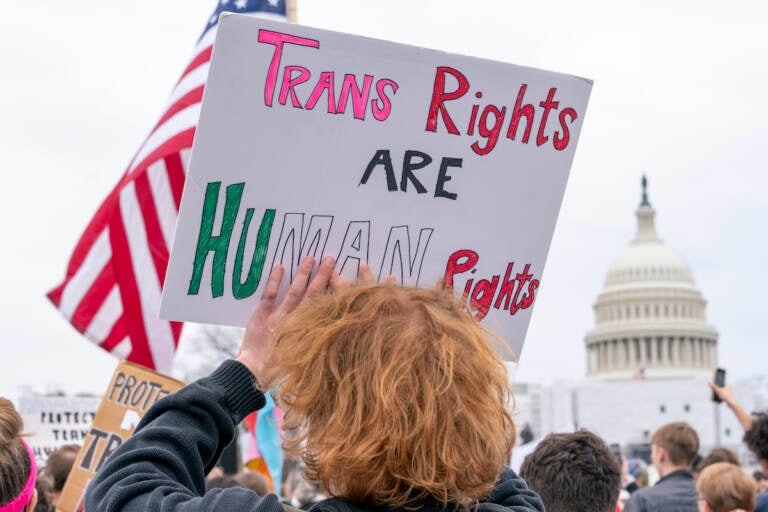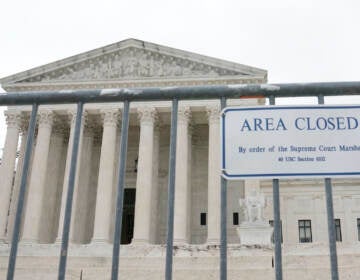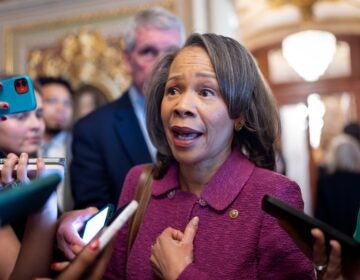U.S. would bar full ban on trans athletes but allow exceptions
The proposal sends a political counterpunch toward a wave of Republican-led states that have sought to ban trans athletes from competing in school sports.

File photo: People attend a rally as part of a Transgender Day of Visibility, Friday, March 31, 2023, by the Capitol in Washington. Schools and colleges across the U.S. would be forbidden from enacting outright bans on transgender athletes under a proposal released Thursday, April 6, from the Biden administration, but teams could create some limits in certain cases, for example, to ensure fairness. (AP Photo/Jacquelyn Martin, File)
Schools and colleges across the U.S. would be forbidden from enacting outright bans on transgender athletes under a proposal released Thursday from the Biden administration, but teams could create some limits in certain cases — for example, to ensure fairness.
The proposed rule sends a political counterpunch toward a wave of Republican-led states that have sought to ban trans athletes from competing in school sports that align with their gender identities. If finalized, the proposal would become enshrined as a provision of Title IX, the landmark gender equity legislation enacted in 1972.
It must undergo a lengthy approval process, however, and it’s almost certain to face challenges from opponents.
The proposal comes on the same day that the Supreme Court said a 12-year-old transgender girl in West Virginia can continue competing on her middle school track and cross-country teams while legal battles over the state’s transgender law continue. The law bans transgender athletes from female teams.
All told, at least 16 now have bans in effect covering at least high school interscholastic sports. Some also extend to intramural, club or college sports. Enforcement of bans in at least three states has been put on hold by courts, and one more has adopted a ban that doesn’t take effect until July.
Under the department’s proposed rule, no school or college that receives federal funding would be allowed to impose a “one-size-fits-all” policy that categorically bans trans students from playing on sports teams consistent with their gender identity. Such policies would be considered a violation of Title IX.
Still, it leaves room for schools to develop team eligibility rules that could ultimately result in restrictions around trans athletes’ participation.
That would be allowed only if it serves “important educational objectives,” such as fairness in competition and reduction of injury risks.
Any limits would have to consider the sport, the level of competition and the age of students. Elementary school students would generally be allowed to participate on any teams consistent with their gender identity, for example, while more competitive teams at high schools and colleges could add limits.
“Every student should be able to have the full experience of attending school in America, including participating in athletics, free from discrimination,” Miguel Cardona, Biden’s education secretary, said in a statement.
The Biden administration used “fairness of competition” as criteria, which has been part of the debate both in the U.S. and globally.
Critics argue transgender athletes have an advantage over cisgender women in competition. Last year, Lia Thomas became the first transgender woman to win an NCAA swimming title. College sports’ governing body, however, adopted a sport-by-sport approach to transgender athletes in January 2022, which was to bring the organization in line with the U.S. and International Olympic committees, though recently the NCAA’s board decided it won’t be fully implemented until 2023-24.
At the same time, international sports-governing bodies are instituting policies that ban all trans athletes from competing in track and field and effectively ban trans women from swimming events.
The Biden administration has made it a priority to bolster the rights of trans students. Last year it proposed a separate federal rule that for the first time would extend Title IX rights to LGBTQ students, broadly protecting them from discrimination in education.
That rule — which drew more than 240,000 comments from the public and sharp opposition from conservatives — is expected to be finalized as soon as next month.
The new proposal doesn’t offer examples of acceptable limits that can be placed on school sports, but it clarifies that restrictions can’t be directed at trans students only. Schools will be left to navigate that tricky legal terrain, with the knowledge that any violation could bring a federal civil rights investigation or lawsuits.
Schools that choose to impose limits must “minimize harms” to students who lose out on athletics opportunities, the proposal says. If a school can achieve objectives like fairness in ways that cause less harm, then the school could be deemed to be violating Title IX.
“Preventing students from participating on a sports team consistent with their gender identity can stigmatize and isolate them,” according to background information provided by the administration. “This is different from the experience of a student who is not selected for a team based on their skills.”
Schools that violate Title IX can face penalties up to a compete loss of federal funding, although no school has ever been dealt that punishment.
WHYY is your source for fact-based, in-depth journalism and information. As a nonprofit organization, we rely on financial support from readers like you. Please give today.






